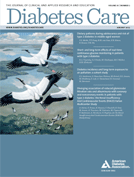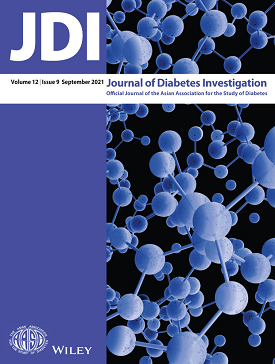
Type 2 diabetes, formerly known as adult-onset diabetes, is a form of diabetes mellitus that is characterized by high blood sugar, insulin resistance, and relative lack of insulin. Common symptoms include increased thirst, frequent urination, and unexplained weight loss. Symptoms may also include increased hunger, feeling tired, and sores (wounds) that do not heal. Often symptoms come on slowly. Long-term complications from high blood sugar include heart disease, strokes, diabetic retinopathy which can result in blindness, kidney failure, and poor blood flow in the limbs which may lead to amputations. The sudden onset of hyperosmolar hyperglycemic state may occur; however, ketoacidosis is uncommon.

Metformin, sold under the brand name Glucophage, among others, is the main first-line medication for the treatment of type 2 diabetes, particularly in people who are overweight. It is also used in the treatment of polycystic ovary syndrome. It is not associated with weight gain and is taken by mouth. It is sometimes used as an off-label adjunct to lessen the risk of metabolic syndrome in people who take antipsychotics.

Low-carbohydrate diets restrict carbohydrate consumption relative to the average diet. Foods high in carbohydrates are limited, and replaced with foods containing a higher percentage of fat and protein, as well as low carbohydrate foods.

The Mediterranean diet is a diet inspired by the eating habits and traditional food typical of southern Spain, southern Italy, Crete and much of the rest of Greece discovered internationally in the early 1960s. This differentiates it from Mediterranean cuisine, which occurs naturally in Mediterranean countries and is inherent to them. While inspired by a specific time and place, the "Mediterranean diet" was later proven and refined based on the results of multiple scientific studies.

The connecting peptide, or C-peptide, is a short 31-amino-acid polypeptide that connects insulin's A-chain to its B-chain in the proinsulin molecule. In the context of diabetes or hypoglycemia, a measurement of C-peptide blood serum levels can be used to distinguish between different conditions with similar clinical features.

The Canadian Medical Association Journal is a peer-reviewed open-access general medical journal published by the Canadian Medical Association. It publishes original clinical research, analyses and reviews, news, practice updates, and editorials.
Thrifty phenotype refers to the correlation between low birth weight of neonates and the increased risk of developing metabolic syndromes later in life, including type 2 diabetes and cardiovascular diseases. Although early life undernutrition is thought to be the key driving factor to the hypothesis, other environmental factors have been explored for their role in susceptibility, such as physical inactivity. Genes may also play a role in susceptibility of these diseases, as they may make individuals predisposed to factors that lead to increased disease risk.
Slowly evolving immune-mediated diabetes, or latent autoimmune diabetes in adults (LADA), is a form of diabetes that exhibits clinical features similar to both type 1 diabetes (T1D) and type 2 diabetes (T2D), and is sometimes referred to as type 1.5 diabetes. It is an autoimmune form of diabetes, similar to T1D, but patients with LADA often show insulin resistance, similar to T2D, and share some risk factors for the disease with T2D. Studies have shown that LADA patients have certain types of antibodies against the insulin-producing cells, and that these cells stop producing insulin more slowly than in T1D patients.

The Journal of Finance is a peer-reviewed academic journal published by Wiley-Blackwell on behalf of the American Finance Association. It was established in 1946 and was, by a 2005 study, considered to be one of the premier finance journals. The editor-in-chief is Antoinette Schoar. According to the Journal Citation Reports, the journal has a 2021 impact factor of 7.870, ranking it 6th out of 111 journals in the category "Business, Finance" and 16th out of 381 journals in the category "Economics".

HNF1 homeobox B, also known as HNF1B or transcription factor 2 (TCF2), is a human gene.

Diabetes Care is a monthly peer-reviewed medical journal published since 1978 by the American Diabetes Association. The journal covers research in the following five categories: 1) clinical care/education/nutrition/psychosocial research, 2) epidemiology/health services research, 3) emerging treatments and technologies, 4) pathophysiology/complications, and 5) cardiovascular and metabolic risk. The journal also publishes clinically relevant review articles, letters to the editor, and commentaries.
Complications of diabetes mellitus include problems that develop rapidly (acute) or over time (chronic) and may affect many organ systems. The complications of diabetes can dramatically impair quality of life and cause long-lasting disability. Overall, complications are far less common and less severe in people with well-controlled blood sugar levels. Some non-modifiable risk factors such as age at diabetes onset, type of diabetes, gender and genetics may influence risk. Other health problems compound the chronic complications of diabetes such as smoking, obesity, high blood pressure, elevated cholesterol levels, and lack of regular exercise. Complications of diabetes are a strong risk factor for severe COVID-19 illness.
Derek LeRoith, M.D., Ph.D is an endocrinologist and Professor of Medicine and the current Chief of the Hilda and J. Lester Gabrilove, M.D. Division of Endocrinology, Diabetes and Bone Disease and Director of the Metabolism Institute of the Mount Sinai Medical Center in New York City. He is an international expert in insulin-like growth factor-1 (IGF-1).
Bernhard Ludvik is a Specialist in Internal Medicine, board certified in Endocrinology and Metabolism. He is currently an Associate Professor of Medicine at the Medical University of Vienna. He serves as the Deputy Head of the Division of Endocrinology and Metabolism at the General Hospital Vienna.
The Annals of Probability is a leading peer-reviewed probability journal published by the Institute of Mathematical Statistics, which is the main international society for researchers in the areas probability and statistics. The journal was started in 1973 as a continuation in part of the Annals of Mathematical Statistics, which was split into the Annals of Statistics and this journal.

Diabetes, also known as diabetes mellitus, is a group of common endocrine diseases characterized by sustained high blood sugar levels. Diabetes is due to either the pancreas not producing enough insulin, or the cells of the body not responding properly to the insulin produced. Diabetes, if left untreated, leads to many health complications. Untreated or poorly treated diabetes accounts for approximately 1.5 million deaths per year.

Pierre De Meyts is a Belgian physician and biochemist known for his research on fine chemical and kinetic aspects of ligand-receptor interaction, subunit assembly, and specific metabolic effects of hormones typically causing receptor tyrosine kinase activation such as insulin and insulin-like growth factors (IGFs). He has also studied receptor signalling for other peptide hormones such as growth hormone and relaxin, and key pathophysiological aspects of diabetes mellitus. De Meyts held professorial posts for over three decades at several European and United States institutions and currently is an emeritus professor in the Science Faculty at the Université catholique de Louvain. While living in Denmark (1990-2010) he occupied executive research positions at Novo Nordisk. De Meyts is also known as a science cartoonist.
Prof. Aly Saad, is a professor of cardiology at Zagazig University and a Member of higher committee of promotion of professors and Assistant professors of cardiovascular diseases and Critical care Subspecialty in Egypt.

The Journal of Diabetes Investigation is a bimonthly peer-reviewed medical journal covering the study of diabetes. It was established in 2010 and is published by John Wiley & Sons on behalf of the Asian Association for the Study of Diabetes, of which it is the official journal. The editor-in-chief is Nigishi Hotta. In 2014, the journal became open-access. According to the Journal Citation Reports, the journal has a 2020 impact factor of 4.232.

Brian M. Frier is a Scottish physician, diabetologist, clinical scientist, and an Honorary Professor of Diabetes at the University of Edinburgh. He is best known for his many scientific contributions to the pathophysiological understanding of hypoglycemia, a common adverse effect of insulin therapy in diabetic patients whose societal impact has deserved increasing media attention worldwide. His honors include the R.D. Lawrence Lecture of the British Diabetic Association in 1986, the Banting Memorial Lecture at Diabetes UK in 2009, the Camillo Golgi Prize and lecture at the 53rd annual EASD conference in 2017, and the Michael Somogyi Award from the Hungarian Diabetes Association in 2004. Frier is a science book author and editor, and a science journal Chief editor. He is also regarded as an authority on the field of driving and diabetes.











